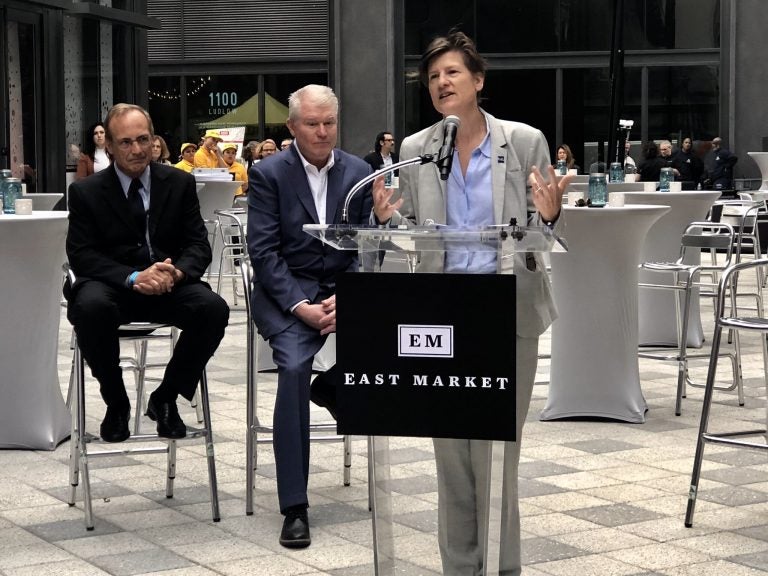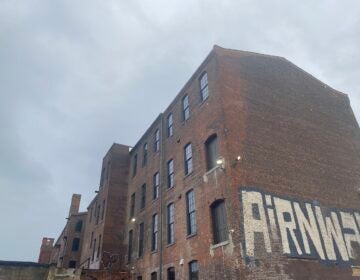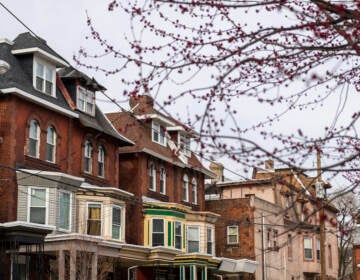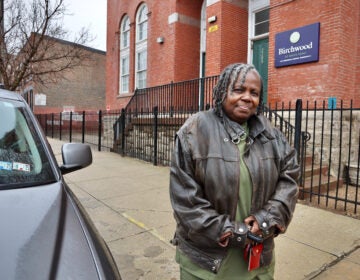Philly’s development director says proposed city budget threatens Land Bank operations
Philadelphia’s Land Bank is the city’s primary vehicle for assembling parcels for developments and a tool for generating affordable housing.

Philly Development and Planning Director Anne Fadullon speaks at a 2018 event. (Billy Penn/Twitter)
Mayor Jim Kenney’s budget doesn’t include new funding for the city’s Land Bank — local government’s primary vehicle for redeveloping vacant public property. The zeroed-out budget proved to be a problem the administration’s Director of Planning and Development Anne Fadullon and City Council could agree on in Wednesday’s contentious budget hearing.
“Not being able to operate the land bank, without any operating dollars, is going to make service delivery very, very difficult,” Fadullon said in response to questions from Council President Darrell Clarke, who voiced concerns about the lack of general fund dollars going to the agency.
Fadullon said the cut in city funding threatened progress on affordable housing projects, business expansion, and community gardens already in the works. “Let alone having dollars to potentially acquire properties through the land bank,” she added.
Clarke’s $400 million Neighborhood Preservation Initiative relies on the land bank as a tool for creating affordable housing and he fears the program — Council’s landmark achievement coming out of the economic and housing crisis of 2020— could face setbacks if the agency isn’t fully operational.
“One of the things that we will need for the Neighborhood Preservation Initiative to be successful, particularly on the production side, is buildable parcels,” Clarke said. “The land bank … will allow us to put together these parcels. Without funding… how do we anticipate moving forward?”
Between 2018 and 2020, the agency’s land sales resulted in the creation of 221 units of housing, 55 of which were designated for market-rate use, and 111 earmarked for households earning 30 to 60% of Philadelphia’s area median household income, or roughly $15,000 to $29,000 a year, according to the Land Bank’s 2020 report. Land Bank Director Angel Rodriguez said in February that more housing would have been created if not for the pandemic and staffing issues.
When the Nutter administration and Council created the Land Bank in 2013 intending to put the city’s 6,000 vacant lots back to productive use, officials assumed property sales would support agency operations. That didn’t happen, Fadullon said, attributing the revenue gap to the rising cost of land. Yet funding the bank to facilitate sales of vacant property is essential to meeting the administration’s equitable development goals, she said.
“Our public land is kind of our last opportunity in some of these communities to provide affordable housing or other types of community amenities,” the planning director said.
Councilmember Curtis Jones and others echoed that point, noting that the Land Bank stands as one of the city’s prime tools to keep long-term residents
“I’ve talked to all my colleagues in other cities that have experienced gentrification,” Jones said. “And the one thing that separates us from them is publicly owned, developable land…for affordable housing.”
Marisa Waxman, Kenney’s budget director, defended the cuts as necessary. She also pointed to competing priorities, like anti-violence programs, which got double their past funding at $19 million. That extra funding was needed for the 911 triage program that is designed to better identify and respond to calls that require mental health needs and for co-responder crisis units after last year’s police killing of Walter Wallace Jr. in West Philadelphia.
“If everything’s a priority, nothing’s a priority, so certain things did get elevated to receive funding that hadn’t been funded in fiscal year 2021,” Waxman said.
Councilmember Helen Gym returned to a point made in prior hearings, asking why the administration is cutting wage and business taxes if it can’t afford to maintain key city initiatives.
“If we are going to do that, we can’t shortchange the Land Bank,” she said. “We need that public financing to ensure that [the Land Bank] can continue to preserve affordability and green space and other crucial uses. It’s not going to come by magic.”
 WHYY is one of over 20 news organizations producing Broke in Philly, a collaborative reporting project on solutions to poverty and the city’s push towards economic justice. Follow us at @BrokeInPhilly.
WHYY is one of over 20 news organizations producing Broke in Philly, a collaborative reporting project on solutions to poverty and the city’s push towards economic justice. Follow us at @BrokeInPhilly.

Subscribe to PlanPhilly
WHYY is your source for fact-based, in-depth journalism and information. As a nonprofit organization, we rely on financial support from readers like you. Please give today.









